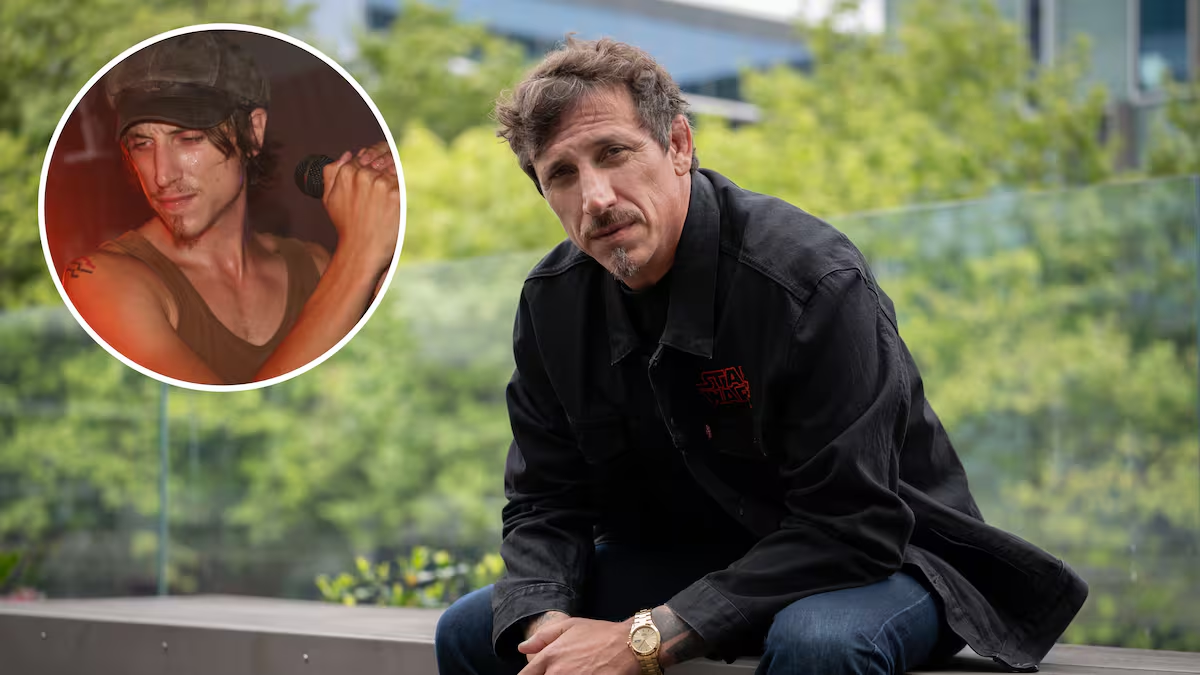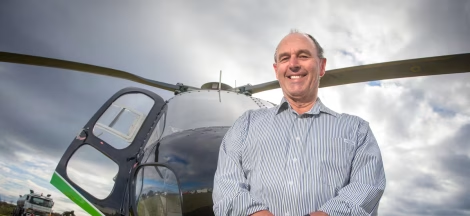“I’m flabbergasted I’m still here,” says Borich, who became one of New Zealand’s most acclaimed musicians as frontman for the band Pluto.

Milan Borich sips on peppermint tea today, laughing at the irony of his choice of tipple. This rock musician barely drinks booze these days – perhaps two or three times a year on special occasions, such as around the Christmas barbecue.
He is nervous about opening up on topics that – if not permanent scars – are certainly shadows. He is not seeking sympathy; he has been on a path of redemption for some time – guided primarily by family, rekindled relationships with his Pluto band members, and the power of jiu-jitsu martial arts.
At 48, he has already had an eventful life. Some of these events have arrived through sheer talent, some through questionable choices, and some have been brought on by bullies.
There were his early school days at a Catholic primary school in Auckland, where the teachers still carried leather straps, even after corporal punishment had been banned in New Zealand.
One particularly sadistic teacher would stand on a desk, jumping with momentum as she belted the kids. Another took a run-up in a hallway.
“It kept on just happening,” says Borich.
“At 7, I played catch and kiss and got strapped again, but it was in front of a girl, and I didn’t want to cry. So he kept on strapping me, until I cried.”
He also became the target of bullies from a nearby school.
“I’d have to walk past this mufti school in my uniform, and just get bullied and bullied. One day, I just threw down my bag and said ‘Right, let’s go’ and I was beaten shitless.”
At 12, he scored a prestigious lead role in The Champion, a TVNZ series based on Maurice Gee’s book. About 400 kids had auditioned for the role of Rex.
“He had an intuitive understanding – he was simply the best and right person for the role,” producer Ginette McDonald said of her acting prodigy at the time.

Photo / TVNZ
It was an experience that Borich firmly loved on set – “a beautiful experience” – and it helped keep him firmly on a path of artistic creativity.
He learned musical instruments such as the piano accordion and tamburica from the age of 4, before developing his singing voice with his mother Berta.
But the TV role also delivered a lot of grief. Many of his friends ostracised him, and he was bullied again at his first secondary school, Rosehill College. He fell into trouble and started wagging. On the recommendation of teachers, his parents moved him to St Peter’s in Auckland.
His first day there came soon after that Coromandel waterfall accident – a tree branch had pierced his leg in the fall; he was on crutches and wearing a brace.
“I’m in a line waiting for my first class. This kid just came out of the line, walked up to me, and says, ‘You are that f***ing dick off television’. And I said, ‘Yeah, that’s me’.
“This guy loaded up and smashed me in the face. I’m like, ‘Welcome to St Peter’s’.”
Eventually, he became close friends with a member of the First XV, a guardian angel with muscles.

Borich reflects on the childhood violence and bullying today.
“I don’t know if it hindered me. It made me mistrusting of relationships and what people actually wanted from me.
“It also made me a bit more resilient in the fact that I didn’t really mind anymore what people thought of me. I could be free or unshackled and wear what I wanted to wear and to say what I wanted to say and grow my hair, whichever way I wanted to grow it.
“It was almost like an awakening of sorts.”
A battle with heroin
Borich’s waterfall accident at 14 reflected a wider, carefree approach to life when he was younger.
“I was a silly daredevil. I had this fascination with doing stuff that was super dangerous. I always had a weird fascination with taking risks and doing pretty silly things.”
Heroin came into Borich’s life after he travelled overseas in his late teens, to Croatia and London.
“I discovered it in Zagreb. We were hanging out with friends of my brother, and they were all into it. I was fascinated with the whole thing.”
He says all of his artistic heroes – icons such as writer William S Burroughs and singer-songwriter Layne Staley – were into the drug at the time.
“I just thought it was the thing to look for.”
He describes his relationship with heroin as “tangled”.
Things got bad quickly in London; he became dependent. “It spiralled, and spiralled and spiralled.”
His first marriage was built on a toxic mess of drugs, and it eventually collapsed.
“I didn’t fully understand why I was so drawn to it at first,” he says of heroin.
“Looking back, I think it came from a deep need to shut everything out. The first time … it felt like a warm blanket had been pulled over me – no more cold, no more fear and no more noise.
“All the thoughts and anxiety in my head stopped. I thought ‘wow, this is exactly what I need’, but I had no idea I was opening Pandora’s box.
“Slowly but surely, it started consuming me and pulling me away from the people I loved and who loved me. I was fading, getting emptier by the day.
“I could see the fear in my parents’ eyes as they watched it happen like a slow-motion car crash. That’s when I realised I had to stop. And I did – on my own terms, with the support of my loving parents.”
His mother came to London for his 21st and could see the massive toll the drug was taking on his life.
“They tried to have an intervention, but it didn’t quite work – it needed to come from me.”
He says he saw an opportunity to leave London and his marriage when his grandmother turned 90.
“I wanted to go back home for my Baba [grandmother] … I saw an escape route. I left for New Zealand and went cold turkey.”
The lure of music
Music, says Borich, has always been pivotal in his life.
“It was fascinating. I just loved it. It just made me feel like I was part of something else that wasn’t in the world – it was an ethereal, spiritual thing for me.”

The genesis of Pluto came in London in the 1990s, when Borich wrote music with long-time friend Tim Arnold. They had collaborated with others previously.
“We always had something – we knew we had something really good when we just put our two heads together.”
Pluto – Borich and Arnold came together with Matthias Jordan, Mike Hall and Michael Franklin-Browne – released their first album in 2001. They played their first concert when they opened for Neil Finn.
Their third album, Pipeline Under the Ocean, arrived in 2005 and sent Pluto into the stratosphere – the band will reunite next month for a one-off, 20-year anniversary concert based on the double platinum album.
A single from that album, Long White Cross, won single of the year at the 2006 NZ Music Awards.
Music writer Tim Gruar once wrote: “Cast your mind back to 2001 … when Pluto burst onto the music scene with their masterful brand of multi-layered rock that mixed and mingled indie, moody pop, hook-laden sing-alongs, angular, full-energy, anthemic rock and even lounge. Borich delights in being impossible to nail down when it comes to being pigeonholed into a genre”.
Today, Borich laughs as he tells me: “I always call it psyphor-delic rock. That’s the term I came up with. Not psychedelic, but psyphor-delic.
“It’s otherworldly. Also, I think the fact that we weren’t able to be pigeonholed could have been a detriment because people couldn’t put you into a space. We were so eclectic that I think it may not have served us well. I don’t know – maybe I’m wrong.”
At the height of Pluto’s peak and Borich’s fame, he relapsed into drugs when touring Australia.
“My character changed, my demeanour changed, and I just became obsessed with other things. Relationships started to waver.”
He went on to methadone.
“I swore that I was never going to come off methadone, because not many people do. I felt like it was fine to be like that. I didn’t realise that it absolutely was not fine to be like that.
“My voice changed, my moods changed. My relationships with most of the band got quite sour because of my mood swings.”
By 2011, Pluto had broken up, a “dark point for me – we ended badly”, says Borich.
Borich’s attempts to start life over in Los Angeles ended quickly when his second marriage collapsed. A possible contract with a music label came to nothing after he missed a critical meeting; devastated, he ended up becoming a bouncer at a prestigious hipster club on Hollywood Boulevard, dealing with patrons such as Lindsay Lohan.
“I was alone in LA and LA can be tough at the best of times. This was the worst of times – it was pretty difficult.
“We’d have all these different kinds of calls; HGAA meant hot girl affirmative action, or hipster affirmative action – because there’s not enough hot girls or not enough hipsters in the bar.
“I’d have to walk down the line [to find them]. It just dehumanised me.”
He said it took five or six years, after returning from the stint in Los Angeles, to mend relationships with his former bandmates.
The power of jiu-jitsu

Borich is a black belt in the martial arts discipline of jiu-jitsu. He credits the sport with helping turn his life around over the past 10-12 years, with constant training, “pretty much every day”.
“For me, it’s pressure testing and problem-solving under pressure.
“I find it fascinating. I like chess as a game. I find jiu-jitsu to be like human chess. There’s always a conversation that goes on between two people when you start sparring.
“Unlike other martial arts like karate or taekwondo … they spar a little bit, but they don’t spar hard. There’s no real pressure testing. With jiu-jitsu, you really do test the functionality and the ability of these techniques to work.”
He says Japanese and Brazilian jiu-jitsu, like music, has set him on the right path.
“When I was not feeling that fabulous about my own life and when I was in a dark place, I found a local Japanese jiu-jitsu club in West Auckland.
“I started training there and I just became fascinated with it. All my other issues and problems just vanished. It’s almost like it’s a meditation.”
Love wins

Today, Borich is married to Sarah Kapeli; they have a young daughter together. Borich also has a teenage daughter from his second marriage, to actor Kate Elliott.
“I had only been back from New York a few months when we met at a friend’s Christmas party … we’ve been inseparable ever since,” Kapeli told the Herald in 2019.
Borich told the Herald at the time: “Sarah is a huge inspiration, our meeting came out of the blue. My dad passed away in November last year after a long illness, so finding love was the last thing on my mind.
“And with our newfound love, I managed to pen the entire lyrics to Alight, one of my favourite tracks on the upcoming album. There will be many more songs surfacing from this deep love I feel for Sarah.”
That same year, Pluto came back together to release its fourth album. Relationships with the band in the past six years have been “fabulous”, says Borich.
Pluto is reuniting again for the concert at Double Whammy in Auckland on November 8. Tickets are on sale now.
I ask Borich if we might see more of Pluto together.
“At the moment, it’s quite difficult because everyone has their own life and their own admin and lots of family. Just trying to get them all together is quite a task, but we do plan to release more music and play more. It’s just the logistics of getting it all together and making it ticketey-boo.”
Ahead of this interview with the Herald, Borich says he’s been reflecting on memories of a life already chock-full of events.
“Some I still forget, and then they come back to me. I’m flabbergasted that I’m still here. Maybe my Baba’s looking out for me. I’ve been remarkably lucky.”
● Pluto is reuniting again for a concert at Double Whammy in Auckland on November 8. Tickets are on sale now at undertheradar.co.nz
- Editor-at-Large Shayne Currie is one of New Zealand’s most experienced senior journalists and media leaders. He has held executive and senior editorial roles at NZME including Managing Editor, NZ Herald Editor and Herald on Sunday Editor. As well as a weekly media column, he has a regular interview series featuring noteworthy and leading New Zealanders including Wayne Brown, Ruby Tui, Paddy Gower, Dame Kiri Te Kanawa, Scotty Stevenson, Chlöe Swarbrick, Simon Power, Josh and Helen Emett, Sir Ian Taylor, David Kirk, Sir Ashley Bloomfield, Paul Henry, Simon Barnett, Sophie Moloney, Brian and Hannah Tamaki, Sir Grahame Sydney, David Lomas, Carrie Hurihanganui, Sir Russell Coutts, Steven O’Meagher, Juliet Peterson, Sir Brendan Lindsay, Tony Astle, and Anna Mowbray.





 Public Service Minister Judith Collins lashes out at unions for ‘politically motivated’ strikes
Public Service Minister Judith Collins lashes out at unions for ‘politically motivated’ strikes